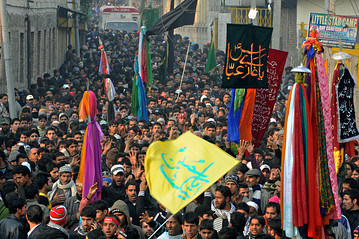No Let up in 25 Year Old Ban on Muharram Procession in Kashmir
Restrictions on the muharram procession remain in place
NEW DELHI: Jammu and Kashmir government once again imposed a curfew in several parts of the Kashmir valley -a practice going on from decades to enforce a ban - ahead of the 8th Muharram procession at the city centre Lal chowk area. Police used brute force to disperse the Shia mourners yet again.
This minority faces the brunt of the repression, even while other religious pilgrimages are allowed with full security and fanfare.
Srinagar resembled a ghost city wth cordons and barricades set up across the summer capital of the state. Restrictions were imposed in areas falling under police stations Shaheed Gunj, Maisuma, Kothibagh, Batamaloo, Ram MunshiBagh and Karan Nagar. The roads were blocked with the barbed wire barricades with Srinagar again resembling a city under siege.
Shia Muslims with the help of other sects used to take out two large processions from Namchbal to Imambara Zadibal and the other from Alamgiri Bazar to Khushalsar. But on the request of the then Chief Minister Sheikh Mohammad Abdullah, a joint procession from Abi Guzar to Zadibal was commemorated.
With the onset of the insurgency in 1990, the then Governor imposed a ban on Muharram processions and since then the two main processions on the 8th and 10th Muharram has been disallowed. Despite Government claims of normalcy on all other fronts , this ban has never been lifted.
"Practising religion is a fundamental right and it is the state Governments responsibility to facilitate it, but sadly they are doing exactly the opposite" said Dr Sheikh Showkat Hussain, who teaches law at Kashmir's Central University.
Sheikh believes that the state Government is scared of these processions, as they feel it will be changed into pro freedom demonstration.
Meanwhile the Shia clerics in the valley too blame the state Government for the mess and said that "if they fear of any attack from some groups, then they should provide the security like they do for other religious yatras.” A case in point is the Amarnath Yatra that is allowed, despite heightened security threats, with enhanced protection and full security measures.
"The Muharram processions commemorates the martyrdom of Prophet Mohammad (SAW)s grandson Imam Hussain(AS) and these processions disseminate the message of peace and goodwill" said Maulana Sheikh Ghulam Rasool Noori, a prominent Shia cleric.
Maulana blames the state Government for " divide and rule politics" and said that Muharram procession brings the communal Harmony.
"It is extremely sad that when whole world promotes freedom of religion, our state Government bans the important religious procession, it is just a political game and nothing else" the Maulana added.
In January 2008, the Kashmir based Shiite organisation Ittihadul Muslimeen filed a petition in the Jammu Kashmir High Court seeking quashing of the ban clamped by the former Governor but the state government did not respond.
In December 2009, J&K high court once again directed the state Government to file the objection, but again did not get a response.
Meanwhile defying the ban thousands of young Kashmiris insist on taking out a procession, and are subjected to brutal police action. “There is nothing we can do now other than to protest and take out processions, The court gave us green signal but Government is in no mood to revoke the ban" the Maulana said.




